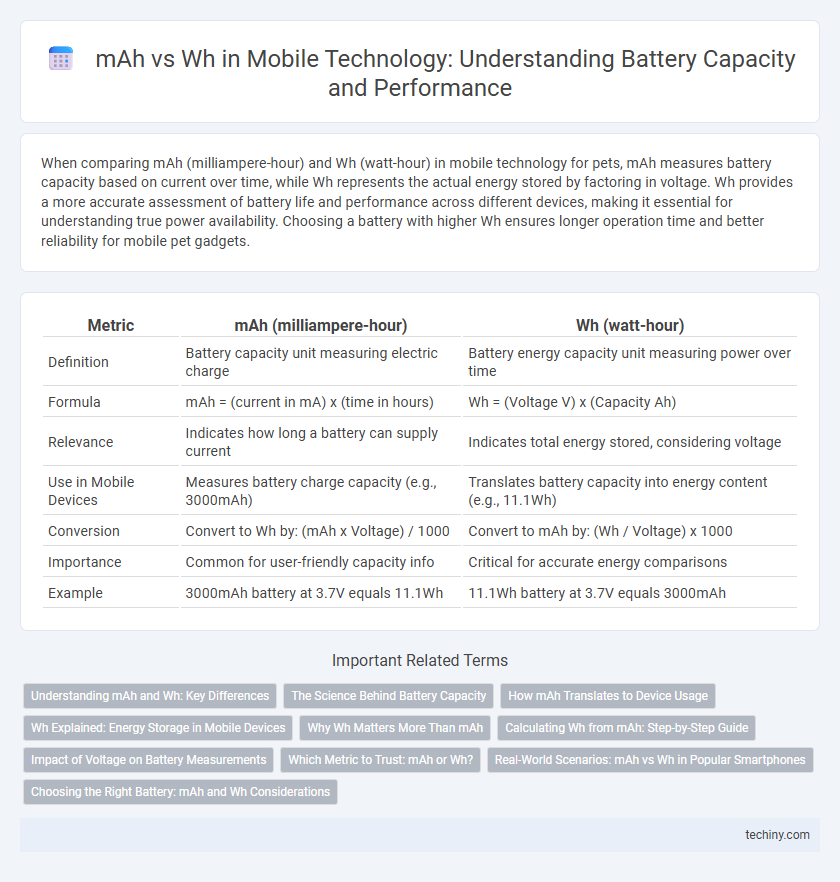When comparing mAh (milliampere-hour) and Wh (watt-hour) in mobile technology for pets, mAh measures battery capacity based on current over time, while Wh represents the actual energy stored by factoring in voltage. Wh provides a more accurate assessment of battery life and performance across different devices, making it essential for understanding true power availability. Choosing a battery with higher Wh ensures longer operation time and better reliability for mobile pet gadgets.
Table of Comparison
| Metric | mAh (milliampere-hour) | Wh (watt-hour) |
|---|---|---|
| Definition | Battery capacity unit measuring electric charge | Battery energy capacity unit measuring power over time |
| Formula | mAh = (current in mA) x (time in hours) | Wh = (Voltage V) x (Capacity Ah) |
| Relevance | Indicates how long a battery can supply current | Indicates total energy stored, considering voltage |
| Use in Mobile Devices | Measures battery charge capacity (e.g., 3000mAh) | Translates battery capacity into energy content (e.g., 11.1Wh) |
| Conversion | Convert to Wh by: (mAh x Voltage) / 1000 | Convert to mAh by: (Wh / Voltage) x 1000 |
| Importance | Common for user-friendly capacity info | Critical for accurate energy comparisons |
| Example | 3000mAh battery at 3.7V equals 11.1Wh | 11.1Wh battery at 3.7V equals 3000mAh |
Understanding mAh and Wh: Key Differences
Milliampere-hour (mAh) measures battery capacity indicating how much electric charge a battery can store, typically used for mobile devices. Watt-hour (Wh) quantifies actual energy stored by combining charge capacity (mAh) and battery voltage (V), reflecting total power available. Understanding both mAh and Wh is crucial for accurately comparing battery performance and endurance across different mobile technology devices.
The Science Behind Battery Capacity
Battery capacity in mobile technology is often measured in milliampere-hours (mAh) or watt-hours (Wh), each representing different aspects of energy storage; mAh quantifies the electric charge a battery can deliver over time, while Wh measures the total energy stored, accounting for voltage. Understanding the relationship between mAh, voltage, and Wh is crucial for accurately comparing battery performance across devices with varying voltages. This scientific distinction enables developers and consumers to assess battery endurance and efficiency more precisely, influencing device design and user experience.
How mAh Translates to Device Usage
Milliampere-hour (mAh) measures battery capacity by the amount of charge a battery can store, directly impacting how long a mobile device can operate between charges. Watt-hour (Wh) accounts for battery capacity and voltage, providing a more comprehensive energy measurement, but mAh remains the most user-friendly indicator for estimating device runtime. Higher mAh ratings generally translate to longer usage times, but actual device efficiency depends on factors like screen size, processor power, and software optimization.
Wh Explained: Energy Storage in Mobile Devices
Watt-hours (Wh) measure the actual energy capacity stored in a mobile device's battery, representing the total amount of power available to run the device over time. Unlike milliampere-hours (mAh), which indicate current flow capacity, Wh combines voltage and charge (Wh = V x Ah) to provide a more accurate understanding of battery life and efficiency. Understanding Wh helps users compare devices with different voltages and estimate real usage duration more precisely.
Why Wh Matters More Than mAh
Watt-hours (Wh) provide a more accurate measurement of a battery's energy capacity than milliampere-hours (mAh) because Wh accounts for both the battery's current (mAh) and voltage. This combination allows users to compare battery performance across different devices with varying voltage levels. Understanding Wh is crucial for evaluating battery life and energy efficiency in mobile technology, ensuring better device optimization and longer usage times.
Calculating Wh from mAh: Step-by-Step Guide
To calculate watt-hours (Wh) from milliampere-hours (mAh), multiply the mAh value by the voltage (V) of the battery and then divide by 1000. The formula is Wh = (mAh x V) / 1000, where voltage varies typically between 3.7V for lithium-ion batteries in mobile devices. Understanding this conversion helps evaluate battery capacity more accurately, offering a clearer perspective on device energy storage and usage.
Impact of Voltage on Battery Measurements
Battery capacity measured in mAh (milliampere-hours) does not account for voltage variations, while Wh (watt-hours) incorporates voltage, providing a more accurate representation of actual energy stored. Voltage fluctuations impact the total energy output; higher voltage results in increased watt-hour capacity even if mAh remains the same. Mobile devices benefit from Wh measurements for precise battery performance evaluation, ensuring better comparison and optimization across different voltage battery packs.
Which Metric to Trust: mAh or Wh?
Choosing between mAh and Wh depends on what aspect of mobile battery performance you prioritize, as mAh (milliampere-hour) measures charge capacity while Wh (watt-hour) represents energy stored. Wh offers a more reliable metric for comparing batteries across different voltages because it accounts for voltage differences by multiplying capacity (mAh) by voltage (V) and dividing by 1000. Trust Wh for assessing real energy capacity and device runtime, particularly when evaluating batteries from various manufacturers with differing voltage specifications.
Real-World Scenarios: mAh vs Wh in Popular Smartphones
Smartphone battery capacity is often measured in milliampere-hours (mAh), which indicates the charge stored, while watt-hours (Wh) measure the total energy capacity accounting for voltage. Popular smartphones like the iPhone 14 Pro Max feature around 4,323 mAh and approximately 16.75 Wh, reflecting battery efficiency tied to device voltage. Comparing mAh and Wh across models like Samsung Galaxy S23 Ultra (5,000 mAh, ~19 Wh) helps users understand real-world battery performance and longevity beyond raw mAh numbers.
Choosing the Right Battery: mAh and Wh Considerations
When choosing the right battery for mobile technology, understanding the difference between mAh (milliampere-hour) and Wh (watt-hour) is crucial for accurate capacity assessment. mAh measures battery charge quantity while Wh accounts for voltage, offering a more precise energy capacity representation essential for device compatibility and usage duration estimation. Prioritizing Wh ensures optimal battery life predictions, especially in devices with varying voltage requirements, enhancing performance and reliability.
mAh vs Wh Infographic

 techiny.com
techiny.com